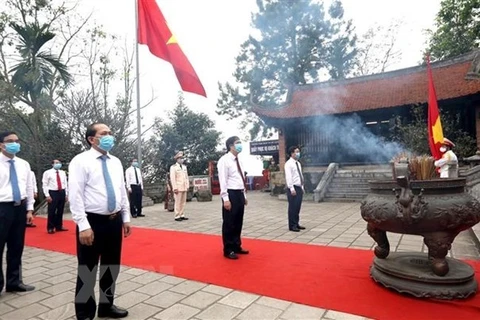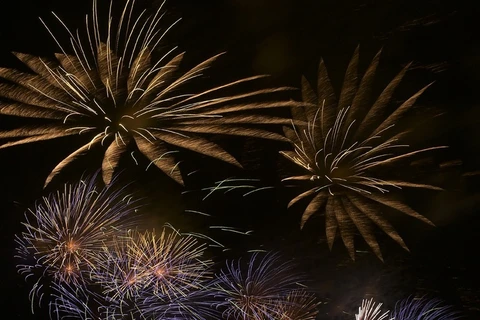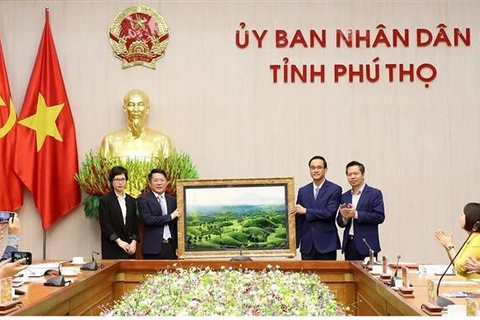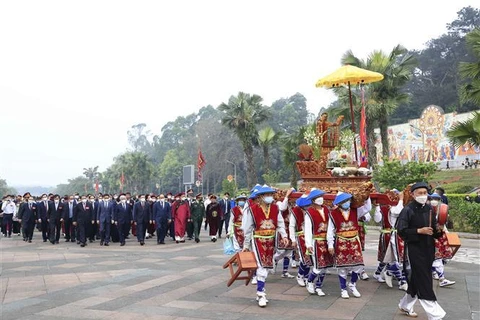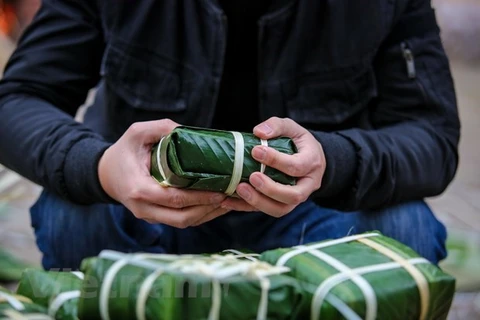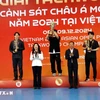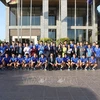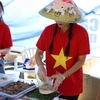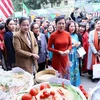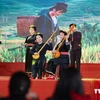Phu Tho (VNA) - The Hung Kings Temple Festival 2023 and the Culture and Tourism Week of Ancestral Land 2023 kicked off in the northern province of Phu Tho on April 21.
A celebration of the 20th anniversary of the implementation of the 2003 UNESCO Convention for the Protection of Intangible Cultural Heritage, and a festival of Vietnamese intangible cultural heritages honoured by UNESCO also took place on the same day.
Addressing the opening ceremony, Deputy Prime Minister Tran Hong Ha highlighted the spirit of solidarity and tradition “when drinking water, remember its source” of Vietnamese people, saying that the unique practice of worshipping Hung Kings expresses the desire for unity, strong will and solidarity against foreign invaders and natural disasters.
The events offer a chance to look back on Vietnam’s 20-year journey as a responsible member in implementing action programmes on protecting intangible cultural heritages, he said.
Deputy PM Ha stressed that the Party and State have paid heed to investing resources in research and restoration of cultural heritages; and encouraging Vietnamese people across the country and those abroad to join hands in promoting the values of the ritual of worshiping Hung Kings and other intangible heritages.
He underlined the need to continue implementing the national target programme on cultural development, carrying out enumeration and dataisation of cultural heritages; mapping heritages on digital platform in order to preserve their values; focusing resources in preserving, restoring and promoting tangible and intangible culture values; and training human resources serving this work.
Hal also praised Phu Tho in preserving and promoting typical cultural values, while asking the Ministry of Culture, Sports and Tourism and the provincial People's Committee to ensure the best conditions for artisans’ performance at the events.
Christian Manhart, UNESCO representative to Vietnam, said that UNESCO was pleased that the Vietnamese Government attaches importance to promoting all aspects of culture to contribute to economic growth.
He congratulated Vietnam on become the second member of UNESCO’s Intergovernmental Committee for the Safeguarding of Intangible Cultural Heritage, saying that with this success, Vietnam is taking on important roles in most of UNESCO's activities and can share its success lessons with other countries in the field of culture.
According to Chairman of the provincial People's Committee Bui Van Quang, the festival provides a chance for folk artisans to perform, practice, and honour heritage quintessence, thus widely introducing them to the community.
The opening ceremony saw the participation of 100 elderly folk artisans and 90 primary school students from four famous Xoan singing clubs in Phu Tho.
The programme also features performances of famous Vietnamese cultural heritages registered by UNESCO such as Then singing; Ca tru singing; Xoe dance of Thai ethnic people; Quan ho Bac Ninh folk singing; Vi-Dam singing; Hue royal court music; Bai Choi singing; Don ca tai tu (southern amateur music), cong chieng (gongs) - a traditional musical instrument of the Tay Nguyen (Central Highlands) region, among others.
This year’s festival will highlight the values of two provincial cultural heritages that have been recognised by UNESCO as part of the Intangible Cultural Heritage of Humanity, namely the worship of Hung Kings and Xoan singing.
Besides traditional rituals like incense offering and palanquin procession, a conference on promoting cultural heritages in association with tourism development and a photo exhibition of Vietnam’s legendary capital land will be also organised within the nine-day festival.
Visitors to the Vietnamese ancestral land will be immersed in numerous sports and cultural activities, like the swimming contest, a football and a volleyball tournament, xoan singing and water puppetry performances.
To those interested in tourism, food and fashion should not miss the chung cake cooking or giay cake pounding contests, food festival, the Northwestern Tourism Fair, children’s ao dai (traditional long dress) festival, the Cultural Camp and Art Festival to celebrate the legacy of the Hung Kings and a trip to explore the ancestral land.
Phu Tho is regarded as the ancestral land and the root of the Vietnamese people. In this place more than 4,000 years ago, Hung Kings founded the country of Van Lang, the first state of Vietnam. From this cradle, valuable cultural heritages of the Vietnamese people were established, including the worshipping of the Hung Kings and xoan singing.
The anniversary of death of Hung Kings is commemorated on the 10th day of the third lunar month, which falls on April 29 this year, and is a national holiday.
Xoan singing was officially recognised by UNESCO as an Intangible Cultural Heritage of Humanity in need of urgent protection in 2011 and the practice of worshiping Hung Kings in Phu THo as part of the world's intangible cultural heritage in 2012./.
A celebration of the 20th anniversary of the implementation of the 2003 UNESCO Convention for the Protection of Intangible Cultural Heritage, and a festival of Vietnamese intangible cultural heritages honoured by UNESCO also took place on the same day.
Addressing the opening ceremony, Deputy Prime Minister Tran Hong Ha highlighted the spirit of solidarity and tradition “when drinking water, remember its source” of Vietnamese people, saying that the unique practice of worshipping Hung Kings expresses the desire for unity, strong will and solidarity against foreign invaders and natural disasters.
The events offer a chance to look back on Vietnam’s 20-year journey as a responsible member in implementing action programmes on protecting intangible cultural heritages, he said.
Deputy PM Ha stressed that the Party and State have paid heed to investing resources in research and restoration of cultural heritages; and encouraging Vietnamese people across the country and those abroad to join hands in promoting the values of the ritual of worshiping Hung Kings and other intangible heritages.
He underlined the need to continue implementing the national target programme on cultural development, carrying out enumeration and dataisation of cultural heritages; mapping heritages on digital platform in order to preserve their values; focusing resources in preserving, restoring and promoting tangible and intangible culture values; and training human resources serving this work.
Hal also praised Phu Tho in preserving and promoting typical cultural values, while asking the Ministry of Culture, Sports and Tourism and the provincial People's Committee to ensure the best conditions for artisans’ performance at the events.
Christian Manhart, UNESCO representative to Vietnam, said that UNESCO was pleased that the Vietnamese Government attaches importance to promoting all aspects of culture to contribute to economic growth.
He congratulated Vietnam on become the second member of UNESCO’s Intergovernmental Committee for the Safeguarding of Intangible Cultural Heritage, saying that with this success, Vietnam is taking on important roles in most of UNESCO's activities and can share its success lessons with other countries in the field of culture.
According to Chairman of the provincial People's Committee Bui Van Quang, the festival provides a chance for folk artisans to perform, practice, and honour heritage quintessence, thus widely introducing them to the community.
The opening ceremony saw the participation of 100 elderly folk artisans and 90 primary school students from four famous Xoan singing clubs in Phu Tho.
The programme also features performances of famous Vietnamese cultural heritages registered by UNESCO such as Then singing; Ca tru singing; Xoe dance of Thai ethnic people; Quan ho Bac Ninh folk singing; Vi-Dam singing; Hue royal court music; Bai Choi singing; Don ca tai tu (southern amateur music), cong chieng (gongs) - a traditional musical instrument of the Tay Nguyen (Central Highlands) region, among others.
This year’s festival will highlight the values of two provincial cultural heritages that have been recognised by UNESCO as part of the Intangible Cultural Heritage of Humanity, namely the worship of Hung Kings and Xoan singing.
Besides traditional rituals like incense offering and palanquin procession, a conference on promoting cultural heritages in association with tourism development and a photo exhibition of Vietnam’s legendary capital land will be also organised within the nine-day festival.
Visitors to the Vietnamese ancestral land will be immersed in numerous sports and cultural activities, like the swimming contest, a football and a volleyball tournament, xoan singing and water puppetry performances.
To those interested in tourism, food and fashion should not miss the chung cake cooking or giay cake pounding contests, food festival, the Northwestern Tourism Fair, children’s ao dai (traditional long dress) festival, the Cultural Camp and Art Festival to celebrate the legacy of the Hung Kings and a trip to explore the ancestral land.
Phu Tho is regarded as the ancestral land and the root of the Vietnamese people. In this place more than 4,000 years ago, Hung Kings founded the country of Van Lang, the first state of Vietnam. From this cradle, valuable cultural heritages of the Vietnamese people were established, including the worshipping of the Hung Kings and xoan singing.
The anniversary of death of Hung Kings is commemorated on the 10th day of the third lunar month, which falls on April 29 this year, and is a national holiday.
Xoan singing was officially recognised by UNESCO as an Intangible Cultural Heritage of Humanity in need of urgent protection in 2011 and the practice of worshiping Hung Kings in Phu THo as part of the world's intangible cultural heritage in 2012./.
VNA

